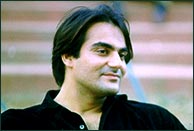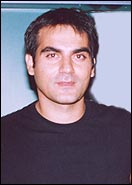 Arbaaz Khan harbours no starry illusions about himself.
Arbaaz Khan harbours no starry illusions about himself.
In his own words, "I just pick from what is best being offered to me."
Earlier in his career, when Salman Khan's younger sibling got tired of waiting for an ideal debut, he agreed to play Juhi Chawla's sadistic husband in Abbas Mustan's Daraar.
Since that first film in 1996, Arbaaz has portrayed shades of black, white, and grey. In his new film Garv: Pride and Honour, he plays a good cop.
The actor talks to Sukanya Verma about Garv and other things on his mind.
On Garv: Pride & Honour: Garv is basically a cop film dealing with a number of issues: inter-department rivalry and the political nexus with gangsters and the police department. It is also a story of how dedicated cops decide to take law and order in their own hands to get some good done for society. They believe that due to some technicality if certain people are let scot-free, who is going to do something about it? A squad is formed of which we are the members. This is just an outline. There are a lot of other interesting aspects in terms of characterisation and screenplay.
On working with elder brother Salman Khan: In both the other films [Pyaar Kiya To Darna Kya, Hello Brother] we were at loggerheads to a certain extent, though it was done in a light-hearted way. In Garv, we are almost together because we work in the same department, in the same post, doing the same assignment. We have the same goals. Both our characters are very interesting. I play Hyder Ali. He plays Arjun Ranawat. It's great working with him. We complement each other in terms of our characters.
 On career choices: I just pick from what is best being offered to me. I don't go too much into the kind of roles I want to do. Unnecessarily I'll be putting a burden on myself if those roles don't come my way, which invariably they don't. You may see a film and imagine a particular character you do. But maybe writers are not writing that kind of stuff. And if they are, they aren't coming to you.
On career choices: I just pick from what is best being offered to me. I don't go too much into the kind of roles I want to do. Unnecessarily I'll be putting a burden on myself if those roles don't come my way, which invariably they don't. You may see a film and imagine a particular character you do. But maybe writers are not writing that kind of stuff. And if they are, they aren't coming to you.
I don't see myself turning into a romantic hero. I may not be comfortable doing that. I may not be cut out to do that. It may not even suit my image.
You have got to be practical. If I think a college-going student's role is going to come my way, it's not. If I think I am going to be the next romantic hero, it's not going to happen. There are a lot of factors why that might not happen. For whatever reason you started your career doing a negative role, it has gone down well. The audience likes your personality in that image. It's not easy to break that [image].
Doing a romantic role is not a problem, it is what kind of romantic role you do that matters. Say, even in a film like Satya, you can have romance, it's how you treat it. I can't be the conventional hero doing romance.
On his debut and the initial frustration: I don't regret doing Daraar. I am very comfortable. I had come to a stage where it was important for me to get going. The clock was ticking. I was eager to start working. Things [film projects] were fizzling out left, right, and centre where work was concerned. Commitments were not being honoured.
Whatever projects I was excited about weren't happening. And the work that was coming my way wasn't the kind of work I wanted to do. Then Abbas Mustan came my way. Despite the fact that it was a negative role, I felt it was more important to work in a good role with a good director in a good set-up as opposed to doing a leading role in a film which probably won't do me any good.
On positive and negative roles: Whenever a negative character of mine works, the offers I get are completely opposite of the roles I have done. It happened after Daraar. The offers that I got were Pyaar Kiya To Darna Kya and Shyam Ghanshyam, which were out and out positive roles. In between there was Soch. Right after Soch, Maa Tujhe Salaam came — it was a positive character. Right now I am doing Garv, where I am playing a good cop. Then I am doing Wajah, where I play a surgeon. I have got a mixed bag of roles. Some grey, some negative, some positive.
If you notice, I am not just doing negative roles. And even if I am doing negative roles, the characters are very imbedded in the script. They are not run-of-the-mill roles. They will have a projection of almost like a second hero in the film.
It's not like you get respect or become successful by doing positive roles only. You can make a niche for yourself doing your kind of roles. That's what I want to achieve.
On direction: I have a dormant director in me. I do think about subjects and films I want to make. I get pretty excited about them. As of now, I don't entertain that feeling too much because I am concentrating on my acting career. There will be a time when I take time out and probably work on a script that I want to produce or direct. But that can wait.
On doing a television serial after Karishma – The Miracle of Destiny: I am not like once bitten, twice shy. If something interesting comes my way, I might be open. But at this point of time, I am concentrating on my film career.
It [the serial Karishma] was just a one-off thing I wanted to do. Unfortunately things haven't gone well as far as I am concerned. I am a little disappointed and dejected with the way I have been handled, not just in the serial but also by the people who committed a lot to me.
 On his free time: I like to spend time with my family and friends. I like to read. I like to spend time on the Net. I like to watch movies.
On his free time: I like to spend time with my family and friends. I like to read. I like to spend time on the Net. I like to watch movies.
On marriage to Malaika Arora: Marriage has brought a certain amount of discipline and responsibility in my life. Subconsciously it has made me aware that I am not just an individual. I have somebody else that I need to work my life with. I know I have to come back home. I have somebody to take care of, somebody I want to be with, respect and love.
We [Malaika and I] are a very normal couple with our share of issues and everything. We respect and love each other's independence and identity. We share a great communication. We give each other a lot of room. We have been together through five years of courtship and five years of marriage. We share a great rapport and relationship.
On fatherhood: Fatherhood has gone and done much more than marriage. It has made me a far more responsible person. It has brought us a lot of joy. We were a couple. Now we are a family. It has also given us a reason to spend a lot more time with each other. A child brings a lot of joy and togetherness.
On forthcoming projects: Anand Pandit's Wajah directed by Gautam Adhikari. It's got Gracy Singh and me in principal characters. It's a story about a husband and wife. The husband is a surgeon. There is some tension between them. For some reason the wife believes that the husband is going to be responsible for her death. It's a suspense thriller so I don't won't divulge much about it.
Priyadarsan's Hulchul is a drama and comedy. It's a wholesome film with a lot of action, drama, comedy, music and romance. It's a masala film.